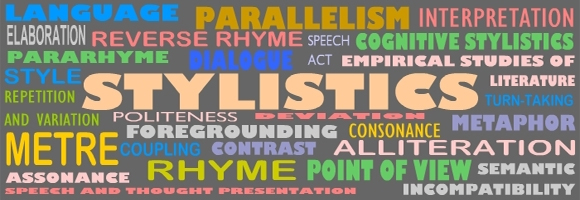
Course Outline
The ENGL322 course offers an introduction to the study of literary stylistics. This involves examining the language of literary texts in the three genres of poetry, prose and drama, with a view to helping students arrive at a fuller understanding and appreciation of these texts. By studying the language of the text, the course aims to help students describe in precise terms such things as the literary achievement of a particular literary text and the communicative strategies employed in it. Once the text has been described, the relative accuracy of critical and interpretative statements about a given text can be evaluated.
The course introduces a number of important principles according to which the language of literary texts tends to communicate, such as foregrounding as demonstrated in the various forms of deviation and of parallelism that occur typically in each of the three genres under consideration. The course does not presuppose any technical knowledge of linguistics, but provides general explanations of principles and tools for the purpose of describing poetic, narrative and dramatic texts. The course will reveal that the language used in a literary text differs from everyday language in purpose and function, but not in kind. The language used in literary texts draws attention to itself in ways that ordinary language does not. Nevertheless, literary language use remains part of the language in general, and an understanding of how language communicates in everyday usage is necessary for understanding how it communicates in a particular literary text. In this introductory stylistics course, we are only able to take a bird’s eye view of a few aspects of this very complex and by nature, interdisciplinary area of study. Nevertheless, some contemporary research areas are identified and references to further reading are supplied for students who may be interested to continue reading at a more advanced level.
The course consists of 14 lessons and two workshop lessons. These are arranged thematically across four units: Unit I Introduction (lessons1-2); Unit II: Poetic texts (lessons 3-7 & Workshop 1); Unit III: Dramatic texts (lessons 8-10 & Workshop 2); Unit IV: Narrative texts (lessons 11-14). Units II and III are each concluded by a Workshop session which enables students to put the stylistic tools they have acquired to practical use in the analysis of a poetic and a dramatic text, respectively. Instead of a workshop, Unit IV is concluded by the term paper which goes through a discussion phase at the proposal phase.
Course Textbooks and Materials
Required Textbooks and Articles:
- Gräbe, Ina Metaphor and Interpretation. Pretoria: University of South Africa (1985).
- Simpson, Paul Stylistics: A Resource Book for Students. London & New York: Routledge, 2004.
- Short, Mick Exploring the Language of Poems, Plays and Prose. London and New York: Routledge, 1996.
- Short, Mick “To analyse a poem stylistically: ‘To Paint a Water Lily’” in Verdonk, Peter (ed.) Twentieth-century Poetry: From Text to Context. London and New York: Routledge, pp. 7-20.
- Jakobson, Roman “Closing statement: Linguistics and poetics” reprinted in Weber, Jean Jacques 1996 the StylisticsReader: From Roman Jakobson to the Present London, etc.: Arnold, [1966] 1996, pp. 10-35. The article is also available online at http://varenne.tc.columbia.edu/bib/texts/jakbsromn600constat.pdf
Strongly Recommended Readings:
- Leech, Geoffrey, Margaret Deuchar and Robert Hoogenraad English Grammar for Today. 2nd ed. Houndmills, Basingstoke and New York: Palgrave, 2006.
- Wales, Katie A Dictionary of Stylistics 2nd ed. Harlow: Pearson, 2001.
A comprehensive English dictionary is essential throughout the course. As a UBC student, you have access to the Oxford English Dictionary online. Please use this invaluable resource!
Course Assessment and Requirements
With the exception of the final exam, all assessment and assignments are online.
- Online participation grade: interactive exercises and questions in lessons by means of discussion groups participation (1% per posted exercise awarded to all members of the group who participated, i.e. a minimum of 15 completed exercises during the course is required for receiving the full grade) 15%
- Workshop participation (interactive and collaborative) (2 workshops; 15% each) 30%
- One term paper: a stylistic analysis of a dramatic text or a narrative text of students’ choice. 25% (Notice that 2% of the total grade for the term paper is awarded to the proposal to be submitted approximately five weeks prior to the due date of the term paper itself)
- Final exam (all three genres and all stylistic principles covered in the course) 30%
